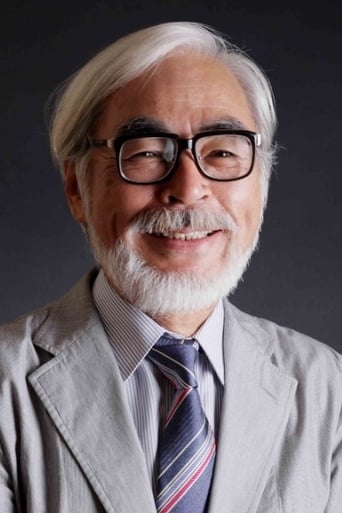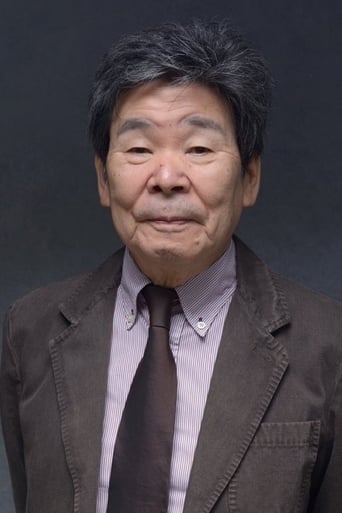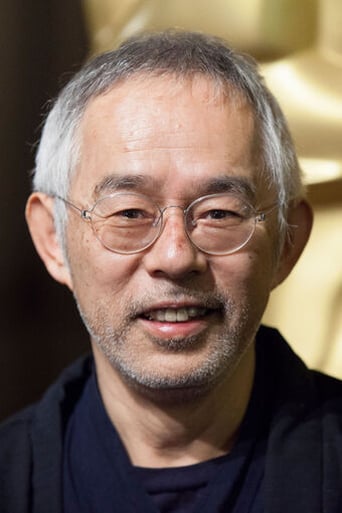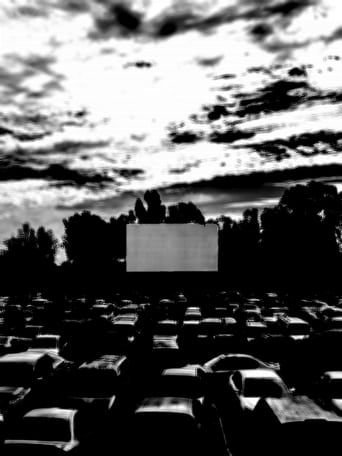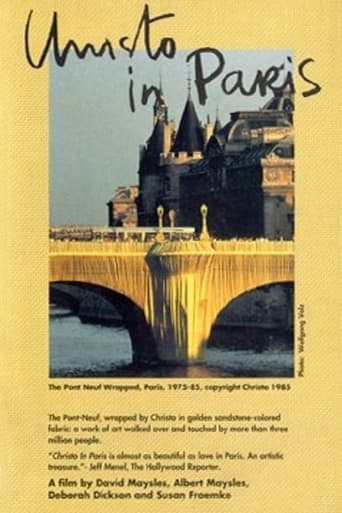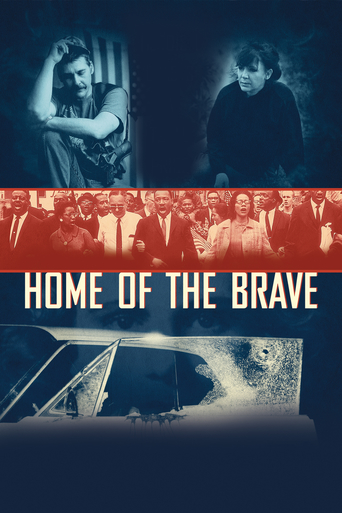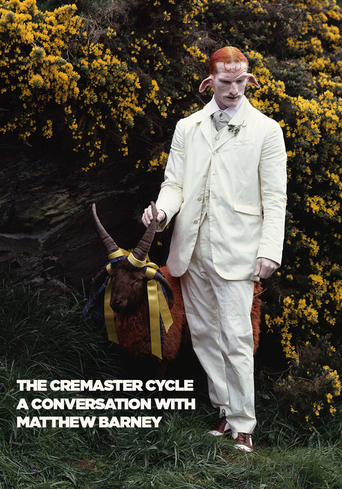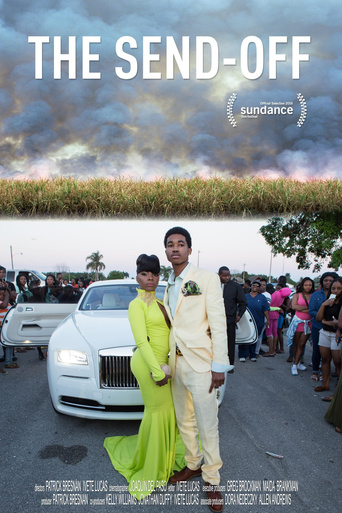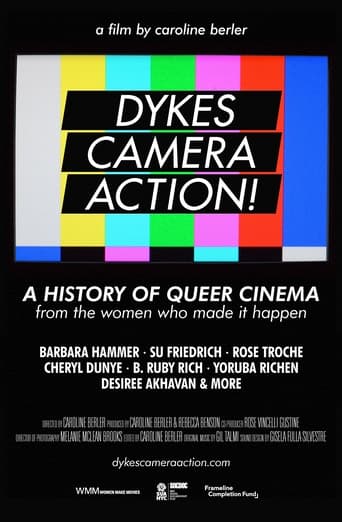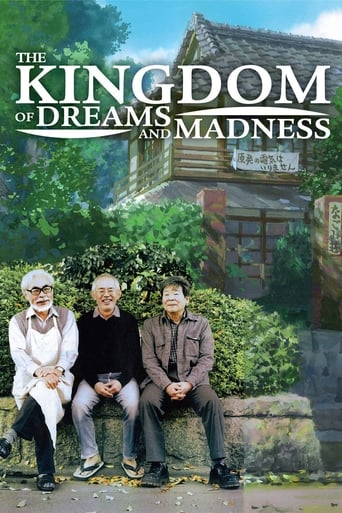
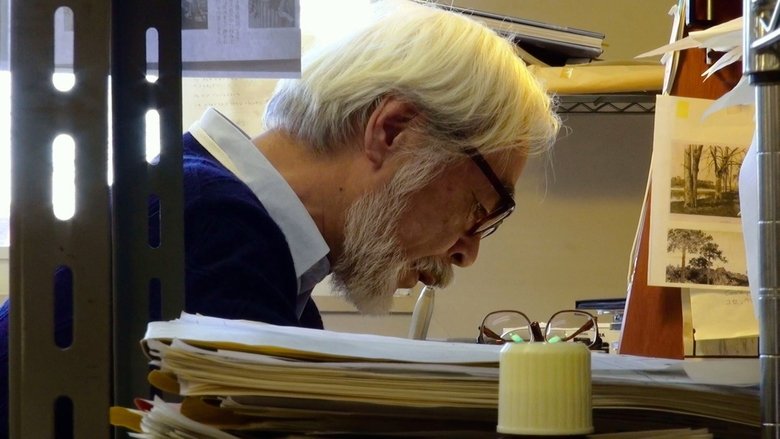
The Kingdom of Dreams and Madness (2013)
Follows the behind-the-scenes work of Studio Ghibli, focusing on the notable figures Hayao Miyazaki, Isao Takahata, and Toshio Suzuki.
Watch Trailer
Cast


Similar titles
Reviews
The Kingdom of Dreams and Madness is a documentary following the life of legendary anime writer Hayao Miyazaki. This documentary focuses on the mannerisms, quirks, and what drives Miyazaki to do what he does as both an artist and a storyboard creator. The ideal audience for this film would obviously be fans of the works of Hayao Miyazaki, but even if you are not familiar with his works you could still watch it and get full enjoyment out of it. Before you watch this film I do recommend watching other films by Miyazaki such as Spirited Away, The Wind Rises, and My Neighbor Totoro, so as to gain understanding of his style. While watching this film you may notice the great detail Miyazaki goes into in each aspect of his life, both professional and personal. Notice the way he writes his storyboards diligently every day, or watches the sunset every evening. Miyazaki is not one to leave others to do his work for him while he sits idly by. The documentary focuses on the struggles he has pushed through to be as successful as he currently is, though I doubt he would own up to his success due to his humility. Miyazaki writes more than stories, he writes metaphors and wisdom. If you watch this film with an open eye you will see the symbolism that seems to be prevalent throughout his movies. The way the camera will focus on the sunset or close in on a phrase seen on the wall all have inverse meanings. Keep your eyes open and you will see between the blurred lines of the camera lens. A main point Miyazaki pushes is to not lose focus on the deeper meaning of his grand tales because they are animated and supposedly for children. This film notes that in his youth Miyazaki lived through an air raid that left him with an awe and appreciation towards flight. Specifically in the A6M3 Zero or just Zero aircraft which he has had an addiction to draw perfectly for many years now. During the film Miyazaki follows the life of Jiro Horikoshi, the creator of the Zero and notes that all of men's dreams are cursed. He believes that no matter what you do or create, it will eventually be used for evil. Miyazaki even believes that philosophy about his own works. Miyazaki feels that the government has become too restrictive of what he can and cannot write about which makes him even more militant to what he wants to write. Though he is vigorous, his vigor will one day run out and he fears there will not be anyone to take his place. In my humble opinion I would say this film is very informative and exciting to the audience it is trying to reach. Others may find it dragging in some places, but may still find it intriguing.
Overall, I really liked this documentary, but it does have some problems I can't ignore. As someone who loves Studio Ghibli, it was really cool to see how the films I love are made, even if it only shows creation scenes from The Wind Rises. Seeing how animation legends like Hayao Miyazaki and Isao Takahata go about their days, I felt, were fairly interesting. What I didn't like, however, was that it didn't go super deep into how other Ghibli films were made, it doesn't go that deep into how the company was formed, and Miyazaki and Takahata never really talk about their own films. I would have loved to hear what inspired them to make those films and what it meant to them personally. But, then again, I don't think they were even going for that. I just think the movie would have been more interesting if they had done what I wanted. Anyway, despite these flaws, I would still recommend this movie. Only to those who love Ghibli though. Everyone else will be quite bored.
Before I watched this documentary about Studio Ghibli and its creator, Hayao Miyazaki, I knew very little about the man but loved his films. Now, after having seen this movie, I kind of wish I hadn't. After all, in my mind, I assumed that Ghibli must have been some sort of magical place where fun and fantasy skipped hand in hand. However, it turned out to be a very different sort of film--a bit slow and amazingly downbeat!The style of this documentary by Mami Sunada is rather free-form. It does not offer a chronological discussion of the history of Miyazaki or the studio. Instead, it just lets the staff of Ghibli (mostly but not exclusively Miyazaki) talk and there isn't much in the way of structure. At times, you hear folks talk about some of this history, but people wanting this sort of film should look elsewhere. So much of the film consists of behind the scenes discussions--some of which really surprised me. If Miyazaki didn't like someone or their work, he said so without being particularly diplomatic about this. And, to be fair, some of his employees talked about him in less than glowing terms and felt free to do so! But what really got me was how the man seemed to have an extremely depressive personality. It's not going out on a limb to draw that conclusion, either, with his comments throughout the film such as "I don't ever feel happy in my daily life" and "filmmaking only brings suffering". Wow...kind of a downer, don't you think? He also very candidly said that he didn't think the studio would survive after his death or with his son in charge. Ouch.So is this documentary any good? Well, it all depends. If you want honesty, and too often biopics are incredibly dishonest, this one is honest...showing Miyazaki warts and all. However, if you want to enjoy a documentary or feel uplifted, you'd best try something else.
Detailed observational doco filmed in Hayao Miyazaki's Studio Gibli building. The studio cat gets as much screen time as Takahata working down the road on The TALE of PRINCESS KAGYUA.The bulk of the footage covers Miyazaki finalizing AS the WIND RISES working in his computer free headquarters, recording voice tracks and music and showing the finished film to his staff.The only person in a suit is the legal rep.Not an unblemished study, as this is likely to be the last film of both these major figures in animation, the record of their work has an extra, slightly melancholy feeling.


